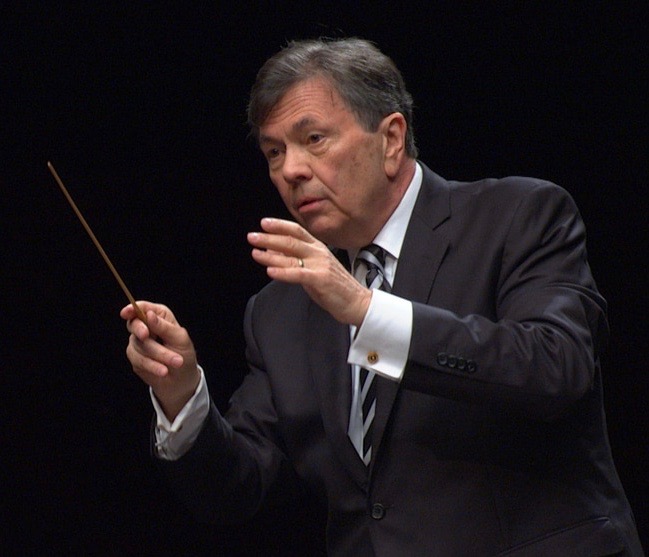Schwarz, Frost Symphony soar to new heights with Diamond and Bruckner

Gerard Schwarz conducted the Frost Symphony Orchestra in music of Bruckner and David Diamond Saturday night.
Last spring Thomas Sleeper retired after a quarter-century at the helm of the University of Miami’s Frost Symphony Orchestra. This season several guest conductors and possible candidates for the vacant faculty position are leading the student ensemble.
On Saturday night Gerard Schwarz, the heavyweight among this group, took the stage of UM Gusman Concert Hall to conduct outstanding performances of symphonies by Bruckner and David Diamond.
Prior to Schwarz’s appearance, associate conductor Alexander Magalong (one of Sleeper’s students) led Junction by student composer Benjamin Webster. The brief score opens with bell-like sonorities from the brass and mallet percussion before string figurations suggest a touch of repetitive minimalism. Magalong shaped the work’s few quiet moments artfully while fully conveying the ballast and brassy aura of Webster’s opus. While there was little depth or subtlety in Webster’s work, the young composer clearly has some skill for orchestration and the fanfare-like score displayed his sense of instrumental color.
Schwarz is a distinguished podium veteran. He has held music directorships of the Seattle Symphony (a record 23 years), Royal Liverpool Philharmonic, Los Angeles Chamber Orchestra and Lincoln Center’s Mostly Mozart Festival. His repertoire is wide ranging but American music of the past and present has long been his specialty. Almost singularly among contemporary conductors, he has championed and recorded the symphonies of Roy Harris, William Schuman, Walter Piston, Howard Hanson and Diamond among others. This repertoire, mostly written in the 1940’s and 50’s, represents some of the finest creativity of American composers.
Diamond (1915-2005) was one of America’s most consistently inspired and inventive composers. That his music has been neglected in recent decades is nothing short of tragic. His Symphony No. 4 was composed in 1945 as a memorial to friends who died in World War II.
While the three-movement work lasts a mere 15 minutes, Diamond’s mastery of melodic development, structure and instrumentation shines through every page. Scored for large orchestra, including two harps, the symphony demands high precision from the orchestral forces and Schwarz delivered that and more. Indeed. he brought the Frost players to a new, strikingly high level.
In the opening Allegretto, Diamond overlays thematic fragments with rhythmic figures. Schwarz brought total clarity to the clipped, swirling musical cells while drawing lustrous tone from the strings and pinpoint definition from the winds.
The second movement, a moving threnody, was eloquently rendered. Over the full string contingent, the harp lines of Elif Dincer and Gabriela Gutierrez emerged with clean definition. Diamond’s incisive final Allegro is quintessentially American in its restless thrust. Schwarz never let the pace slacken and the orchestra played with vigor and high precision. Special credit to the terrific trumpets.
The symphonies of Anton Bruckner are as commonly encountered in Miami as snow. One can count on a couple fingers the number of performances they have received locally in the past decade.
All credit to Schwarz for programming the Symphony No. 4 in E-flat Major (“Romantic”). This work represents Bruckner at his most lyrical and, at times, episodic and diffuse. Schwarz’s strong conception of the score kept keen momentum in a purposeful, straightforward manner and his taut tempos avoided monotony in the less inspired pages. The building blocks of the spacious opening horn theme gradually evolved into a full-throated brass proclamation. The five horns produced a finely blended sonority. With the exception of a brief moment of faltering intonation from the violins, the orchestra navigated Bruckner ‘s sonic tapestry securely.
Schwarz phrased the opening subject of the Andante in almost martial fashion. With nine double basses at stage left providing strong underpinning, the strings sounded full and mellow in the Viennese manner. Schwarz marshaled his forces to tremendous climactic volleys, bringing forth Bruckner’s cathedral of sound in full regalia.
The third movement is one of Bruckner’s most thrilling scherzos. Horns and trumpets crackled with power and exactitude. Schwarz nicely contrasted the clarinet-led trio section, shaping a peasant landler with almost Mozartean grace. The Wagnerian proclamations of the finale resounded splendidly but Schwarz also brought out the warmth and charm of the contrasting melodies. Winds and strings played with an edge-of-the-seat intensity.
Schwarz’s sense of dynamics, even in the bright and challenging Gusman acoustic, was masterful. From hushed string pianissimos to climactic chorales, instrumental choirs reveled in a huge range of volume and tonal hues.
Schwarz acknowledged numerous individual players and sections during the well-deserved standing ovation. Natalie Miller’s horn solos throughout were delivered with clarion finesse. Frost faculty member Scott Flavin conducted initial rehearsals and deserves special credit for helping prepare the ensemble for Schwarz.
Kudos to Gerard Schwarz for presenting an uncompromising program that challenged players and audience alike. With the impressive performances he commanded from the students, he should be a prime candidate for the Frost conducting and teaching positions. His high artistic standards and bold repertoire choices would bring added prestige to the Frost School of Music.
Michelle Merrill conducts the Frost Symphony Orchestra in Verdi’s Overture to La Forza del Destino, Falla’s The Three Cornered Hat (with mezzo-soprano Robynne Redmon) and Mozart’s Piano Concerto No. 17 with soloist Santiago Rodriguez 8 p.m. November 16 at UM Gusman Concert Hall in Coral Gables. frostmusiclive.com; 305-284-2400.
Posted in Performances
Leave a Comment
Sun Oct 14, 2018
at 1:40 pm
No Comments






